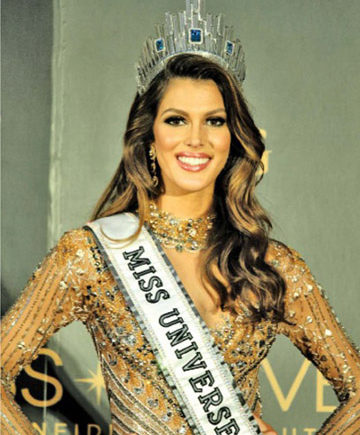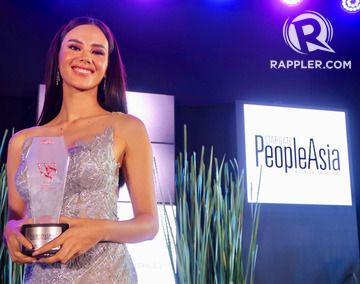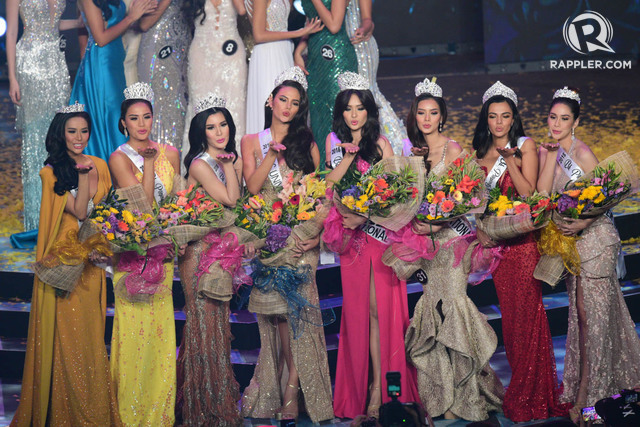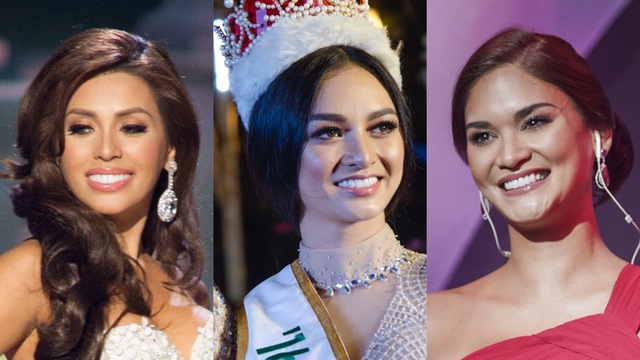I was quoted in this article is written by Alex Y. Vergara.
Three days after the 65th Miss Universe beauty pageant in Manila, “beau con” fans are still abuzz with talk and post-pageant “analysis” about its ultimate outcome.
Forget Miss Venezuela Mariam Habach’s mysterious exclusion from the top 12. It most likely had something to do with the Miss Universe Organization (MUO) and the former frontrunner and her alleged “attitude problem.” The pageant’s biggest surprise was the come-from-behind entry and near-win of Miss Haiti Raquel Pelissier.
Except for a few pageant pundits, including designer Noel Crisostomo, who predicted that Pellisier would go far in the contest, no one took her seriously until she kept on progressing and eventually reaching the top three during the contest.

Magnetic personality the newly crowned Miss Universe Iris Mittenaere, a 24-year-old dental student, during her first press conference. (Portrait by Noel Pabalate)
Crisostomo, in a “fearless” forecast that appeared in Manila Bulletin Lifestyle on the eve of the pageant, said of the Haitian beauty queen who claims to have Filipino blood: “I love her in the gold beaded evening gown during the preliminaries. She’s very elegant and very natural. I think she’s the total package—lovely and speaks five languages. She will surprise everyone on Monday.”
And surprise us she did. “As pageant observers, it’s always the Latinas we watch out for,” said publicist Albert Almendralejo. “This year, however, the Asian candidates also came out strong. We knew USA and a number of Europeans would reach the semis, but we never seriously considered Kenya or Haiti. Call it pageant favoritism on our part. Also, we’re not privy to what went on during the one-on-one preliminary interviews. Many dark horses like Haiti, Kenya, and even France usually emerge after these interviews.”
Almendralejo, of course, is referring to France’s Iris Mittenaere, the pageant’s eventual winner. Although many observers tipped her to break into the top 12, none of them really saw her slaying on stage frontrunners like Colombia’s Andrea Tovar, Thailand’s Chalita Suansane, even hometown girl Maxine Medina.

Miss France Iris Mittenaere in a clingy and beaded canary yellow gown
“I was really rooting for Haiti all the way,” said Crisostomo. “I felt that one of the reasons she wasn’t noticed by pageant fans, especially Filipinos, was the fact that she peaked too late. The crowd didn’t really notice her until she answered the final question. All eyes were on France and Colombia near the end of the show.”
In the eyes of many pageant fans, it was Pelissier and not Mittenaere, who managed to come up with a fairly cohesive and respectable answer, who had the more memorable and dramatic answer to the final question.
Asked by Miss Universe host Steve Harvey to “name something over the course of your life that you failed at and tell us what you have learned about the experience,” Pelissier, unlike the others, had to ask him again to repeat the question. It also took her a few seconds to gather her thoughts.
“About seven years ago, I survived the earthquake and I thought I was failing,” she said, her voice cracking. “I wasn’t living my dream. I was living day by day. And that earthquake, it was such a very bad event, but I chose to be a very positive person and learn a great message from it. If I’m here today, it’s because I’m living my dream.”
But after nearly stealing the show with her seemingly heartfelt answer, Pelissier suddenly found herself bowing down to Mittenaere. The French beauty queen from Lille ended her country’s almost 64-year Miss Universe title drought. Again, our pageant analysts have plenty of things to say about Mittenaere—victory over her Haitian rival.
“Personally, I feel that France has a much wider appeal, a more approachable look that could open up possibilities for MUO in the European market,” said pageant watcher Voltaire Tayag. “Haiti was amazing, but her look can come off as too fierce, too strong, and too intimidating.”
“It’s not just about the final answer, but the overall impression each girl gave,” Tayag continued. “If I had to chose between two equally qualified candidates for a certain job, I’d probably end up choosing the one who seems more relatable and easier to work with. In this case, it would be France.”
Stylist Monika Ravanera, makeup artist Gio Flores, and -share almost the same analogy. Without meaning to imply that one girl is prettier than the other, the contest’s final result, they said, all boiled down to looks and the candidates” innate charisma.
“Backstage, Miss France was more charming,” said Ravanera. “She has a magnetic personality and a contagious smile. Miss Haiti nailed it in the final question, but for me, she is more of a model type—from her height to her bone structure. Without a doubt, she has strong stage presence. But when you see her in person, the first thing that will come to your mind is this girl is a model.”
“We were seated in the front, and we saw how incredibly beautiful France was,” said Flores. “She seems very grounded and humble, too. Apart from having the brightest aura that morning, I felt that she spoke from the heart. For me, she’s the blonde version of MJ Lastimosa.”
Flores went on to emphasize that IMG, new owner of Miss Universe, is a talent management company. France appears to be the more marketable girl compared to Pelissier and Tovar, the two other finalists in the top three.
“Iris is the total package,” Flores said. “Miss Universe, despite its supposed new thrust under IMG, has been known for choosing someone with an arresting facial beauty and physique. It helps that Iris also has a magnetic personality.”
Geopolitics and not politics within MUO per se may have also played a hand in Mittenaere’s win. Apart from ending France’s own Miss Universe drought, she also ended Europe’s drought. The last time a European won Miss Universe was way back in 2002 when Russian beauty queen Oxana Federova won the crown. But before she could complete her one-year reign, she was dethroned in favor of Panama’s Justine Pasek.
“Aside from being gorgeous in her evening gown, France won because politically, it’s time for a European to win,” said Almendralejo. “The immigrant issue in Europe is one of the hottest issues in the world today. We have to remember that Miss Universe is also a politically oriented organization, with multinational judges and a penchant to take raging global issues into consideration.”
Last year, for instance, when Pia Wurtzbach won, many pageant observers were predicting that the French delegate would earn a spot in the finals because of the series of deadly bombings that took place in Paris. And Flora Coquerel, last year’s Miss France, did perform well. It was a “learning experience” for many pageant pundits then, Almendralejo added.
“Even before the top 12 was announced, I was already thinking that at least one European would join the semis to call attention to the continent-wide problem of mass immigration, especially coming from the Middle East. France had the most relevant and politically correct answer in the final round. I wasn’t surprised she won,” he concluded.
Crisostomo, who rooted for Pelissier to the very end, acknowledged the fact that Mittenaere came with the so-called “sash factor,” or weight in Miss Universe not normally possessed by or given to island-nations like Haiti, Aruba, Guam, Curacao, Cayman Islands, or even certain bigger countries in Africa, Central Asia, and parts of Latin America.
“France has sash factor in Miss Universe, while Haiti doesn’t,” he said. “Didn’t you notice that Haiti had more applause in the end compared to France and Colombia. Raquel (Pelissier) is not your conventional beauty. I thought that was what Miss Universe was looking for this year. I was really surprised she didn’t win.”
This article originally appeared in Manila Bulletin.
All photos courtesy of MB unless otherwise indicated.




